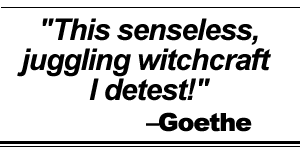 Money Talks Coleman sops up flattery from the gilded quarters by
Mike Mosedale Coleman's assessment of Clancy, though, was a fitting embellishment upon Reagan's take on an early effort by the very same techno-vulgarian. The Great Communicator, whose depressingly bad taste seems so typical of the contemporary politician, referred to a Clancy novel as "the perfect yarn." Yes, Reagan and Coleman have much in common. It was not surprising, thus, to see the expatriated Democrat on the receiving end of some unctuous flattery from the gilded quarters, specifically in the form of a March 9 Forbes magazine story titled: "A Tale of Two Cities: How a pro-business mayor reversed an old city's long decline." Even by the anemic standards of a bald-faced Republican house organ like Forbes, the piece defied minimal standards of fairness and good journalism. Mounted in the center of this flaccid polemic is a color photograph of Coleman, his up-turned, toothy mug in heroic three-quarter profile against the backdrop of the allegedly gleaming St. Paul skyline. Very Leni Riefenstahl. More objectionable, though, is the text. Authored by some Michelle Conlin person, the story makes no mention of Coleman's gubernatorial ambitions, nor does it question any of the many sweetheart deals he has engineered in the course of his tenure. Indeed, Conlin praises Coleman for paying a ransom to Lawson Software and, thus, luring the state's largest software developer away from its current headquarters in northeast Minneapolis. "The moral is so simple it's almost painful," Conlin concludes. "If you want the benefits that business can bring to your town be nice to business." Obviously, one big reason many core urban areas are in trouble these days is because of the economic war between states, cities and suburbs. The remedy, Forbes suggests, is more corporate subsidies. Lawson CEO William Lawson acknowledges as much in his direct and telling quote: "Minneapolis didn't have anything to give us." But Forbes, in its devotion to the corporate bottom line over any and all other concerns, insists what's good for business is necessarily good for America. Thus, Minneapolis Mayor Sharon Sayles Belton, rudely labeled "an incompetent lightweight," is pilloried for failing to pony up a new stadium for billionaire banker and Twins owner Carl Pohlad. Coleman, conversely, receives kudos for putting St. Paul taxpayers on the line to the tune of $130 million to bring the NHL to town. Norm surely must have basked a while in the glow of this piece of puffery, especially since it emanates from a national publication. He is characterized here as "a scrappy, fast talking Brooklyn native" who journeyed west to make the Good Life in Minnesota better yet. What a whopper. Coleman is, in reality, the most modern of political operators, a guy who drifted to the right from his long ago, long-haired, bullhorn-toting days as a student radical; a guy who drifted to the right in lock step with white suburbia; a faux-populist whose man of the people pose seems to evaporate in the privacy of his sordid assignations with his masters in the comfy, leather-stuffed boardrooms. For focus group characters like Coleman, of course, this all comes quite naturally - the mere product of a quick bit of political calculus and the whetting of the thumb to see which way the wind is blowing. And for publications like Forbes, it makes him some sort of hero. Yuck. |
 purchase of the Minnesota Vikings, Coleman
rushed to declare the former insurance salesman from Baltimore "the best darn writer
in America." That preposterous utterance surely embarrassed and horrified Norm's
former English professors at Hofstra, just as the mayor's rube-ish plan for a Leroy Neiman
museum in downtown St. Paul must have rendered his art history instructor apoplectic.
purchase of the Minnesota Vikings, Coleman
rushed to declare the former insurance salesman from Baltimore "the best darn writer
in America." That preposterous utterance surely embarrassed and horrified Norm's
former English professors at Hofstra, just as the mayor's rube-ish plan for a Leroy Neiman
museum in downtown St. Paul must have rendered his art history instructor apoplectic.